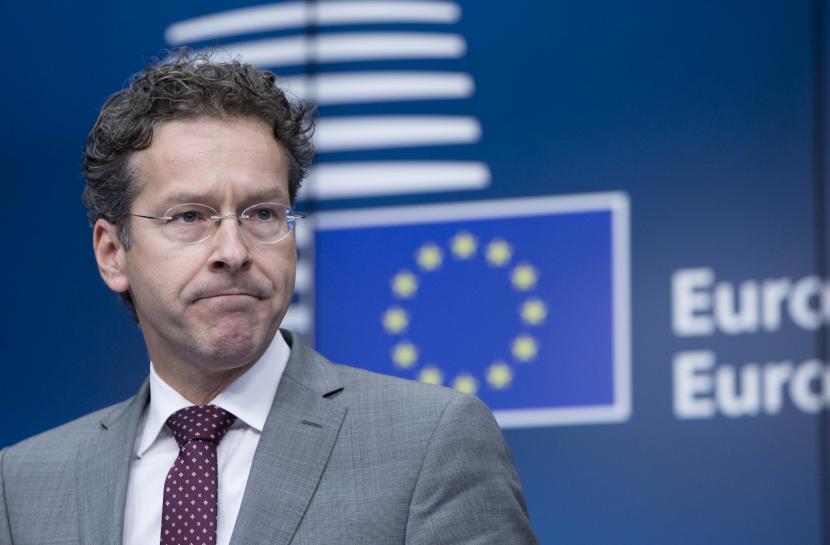
By upsetting southern Europeans with remarks about drinking and womanizing, Eurogroup president Jeroen Dijsselbloem has damaged his hopes of retaining his job and raised the possibility of a round of horse-trading over key economic posts in the euro zone.
BRUSSELS By upsetting southern Europeans with remarks about drinking and womanizing, Eurogroup president Jeroen Dijsselbloem has damaged his hopes of retaining his job and raised the possibility of a round of horse-trading over key economic posts in the euro zone.
Dijsselbloem, the Dutch finance minister, chairs meetings of the 19 euro zone finance ministers who make decisions for the single currency area. Known for his firm line on bailout terms for Greece, he was clear favorite until this week to be renamed to the post once his current term ends in January.
Then came the row over an interview in which Dijsselbloem suggested the southern EU states could not expect aid if they squandered their money on “booze and women”, triggering a furious reaction from Portugal, Italy, Spain and Greece.
Some euro zone officials said the affair would blow over and would not affect the decision on the Eurogroup chairman role. But others said it was a good excuse for some governments to push for replacing Dijsselbloem.
“It is more than a storm in a teacup, because he has a lot of enemies in the South and they have just been waiting for something like this to use against him,” one euro zone official said.
With no obvious candidate to replace him, uncertainty over Dijsselbloem’s succession could disrupt difficult euro zone talks with Greece on terms for releasing more bailout funds.
And if the role does become vacant, negotiations over a replacement would be complicated by national and political party interests as the EU also prepares to fill two other top jobs.
Spanish Finance Minister Luis de Guindos has competed with Dijsselbloem for the Eurogroup role in the past, and Spain has long complained that despite being the euro zone’s number four economy it does not hold major posts in the EU at the moment.
Madrid would welcome the Eurogroup job for de Guindos, although it might be more interested in securing the position of European Central Bank vice president next year, when the eight-year term of Portugal’s Vitor Constancio comes to an end.
Spain has good candidates for the ECB – former senior IMF and Spanish central bank official Jose Vinals and the general manager of the Bank for International Settlements, Jaime Caruana.
LEFT VS RIGHT
One factor in favor of Dijsselbloem, a socialist, is that EU leaders want to review the sharing-out of top jobs. Socialists are the second-biggest force in the European Parliament, but nearly all the main EU posts are filled by center-right politicians.
De Guindos is center-right, which would favor Spain’s bidding for the central bank role, where party backing is much less important then the nationality of the expert candidate.
Other socialist finance ministers who could be considered instead of Dijsselbloem are Slovakia’s Peter Kazimir, Malta’s Edward Scicluna and Portugal’s Mario Centeno, but officials said for now none of them had backing as strong as the Dutchman.
Another top economics job that could enter into the bargaining in January 2018 is the president of the European Investment Bank, the EU’s lending arm, as the six-year term of Germany’s Werner Hoyer comes to an end.
To stay as head of the Eurogroup, Dijsselbloem needs a simple majority of votes among the 19 ministers. So far the custom has been to choose the president by consensus for a renewable 2-1/2-year term.
Another complication is that Dijsselbloem’s party did poorly in this month’s Dutch election and he will be replaced as finance minister in a matter of weeks or months.
Eurogroup regulations say the president must be a sitting minister. So if Dijsselbloem’s peers wanted him to stay on, they would have to change the rules and create a new permanent position.
“The uproar about the remarks will surely have an impact on his chances of becoming the permanent Eurogroup president, if a decision on a permanent president is taken,” a second euro zone official said.
Under the rules, if Dijsselbloem was unable to fulfill his duties he could be replaced by the finance minister of the country that holds the EU presidency. That would mean Malta until the end of June and Estonia in the second half of the year, until a new Eurogroup president is chosen.
Ministers have yet to discuss Dijsselbloem’s future, and he plans to call each of them over the coming weeks to find out their views. But some sources said the group was unlikely to go for the permanent option.
“Ministers want one of their own, somebody who faces the same pressures and troubles as them,” a third official said.
“Advice on budgets from somebody who doesn’t have to make a budget does not go down well.”
(Reporting by Jan Strupczewski- Editing by Mark Trevelyan)
 0 comments
0 comments





